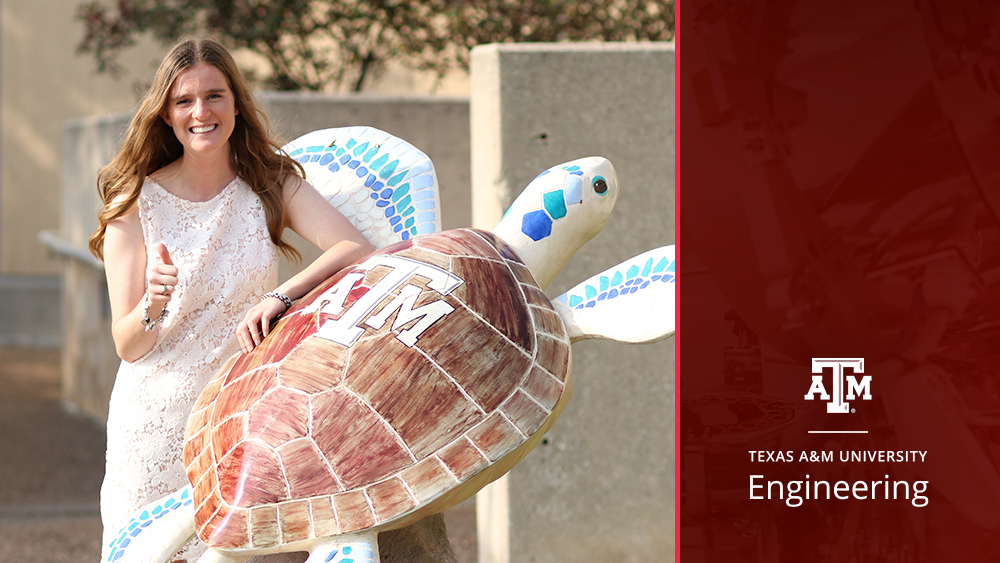
After growing up near Galveston, Texas, and living through Hurricane Ike, Jaclynn Turnbaugh realized she wanted to dedicate her efforts to protecting coastal communities like her own. By winning the prestigious Texas A&M University Hagler Graduate Fellowship, Turnbaugh can conduct research to mitigate coastal erosion and help these communities during severe weather conditions.
“I've seen the damage that erosion and hurricanes can cause firsthand,” Turnbaugh said. “I have a personal tie to it, and hopefully, this research will contribute to naturally mitigating erosion and slowing down some of that destruction.”
The ocean engineering doctoral student’s research focuses on microbially induced calcium carbonate precipitation (MICP). This process involves both a bacterial and a cementation mixture.
Bacteria react with a cementation solution to hold the sand grains together at a microscopic level. This process essentially “glues” sand grains to one another, thereby strengthening the sediment matrix. The goal is to determine if there is a more natural approach to make beaches and dunes more resistant to erosion during storms.
“Storms are going to continue to happen,” Turnbaugh said. “If anything, they're going to increase in intensity. The outcome of this project will be seeing if MICP can really provide advanced protection during storms and to see if that risk can be quantified. The goal is for coastal communities to use that information to better protect themselves when storms come.”
Through the Hagler Fellowship, Turnbaugh can collaborate with mentors such as her committee chair Dr. Jen Figlus and Hagler Faculty Fellow Dr. Sebastian Jonkman to mitigate erosion and see if MICP can reduce flood risk potential.
“I think it's a great opportunity to get to work with Dr. Jonkman,” Turnbaugh said. “It's been exciting to learn from him and be able to partner with him because we have different areas of expertise. I’m grateful to Dr. Jonkman for helping me advance my scientific knowledge and learn something new.”
Turnbaugh is working to combine her research with Jonkman’s experience as an expert in flood risk quantification to examine that which hasn’t been explored up until this point to quantify MICP and its impacts.
“We can not only provide that, but also tie in a numerical value to this process. Later, it could provide positive impacts and can be beneficial to coastal communities,” Turnbaugh said.
Turnbaugh and her mentors have already done field testing with MICP, and now, they are working to create dune models in a wave flume, like a bathtub with a motor at one end. The motor then pushes a paddle that generates a wave based on different wave parameters. The input conditions can be used to model a storm that will propagate across the flume.
They want to be able to run waves over the dune model to see what happens when MICP-treated dunes are subjected to simulated storms and see if they can prolong the amount of time before the dune erodes or is damaged in any way.
“Dunes are most impacted when they're under storms,” Turnbaugh said. “We want to recreate a dune and subject it to storm conditions in the wave flume so that we can then gather data that we can analyze later to see how MICP impacts the dune throughout a storm.”
Before winning the fellowship, Turnbaugh completed her undergraduate degree in ocean engineering at Texas A&M in 2020 and plans to graduate from Texas A&M University at Galveston in 2025. After graduation, she hopes to use her research to consult, design and implement various coastal protection measures along the Texas coastline.
“I am really excited because I feel that my work has a lot of applicability for the real world,” Turnbaugh said. “It may be a natural way to mitigate erosion, so it has a lot of advantages and opportunities to be incorporated into coastal protection schemes. That's something I'm really passionate about and why I got into ocean engineering: to be able to protect coastal communities. It's very exciting to research something that could have such a positive impact later on.”